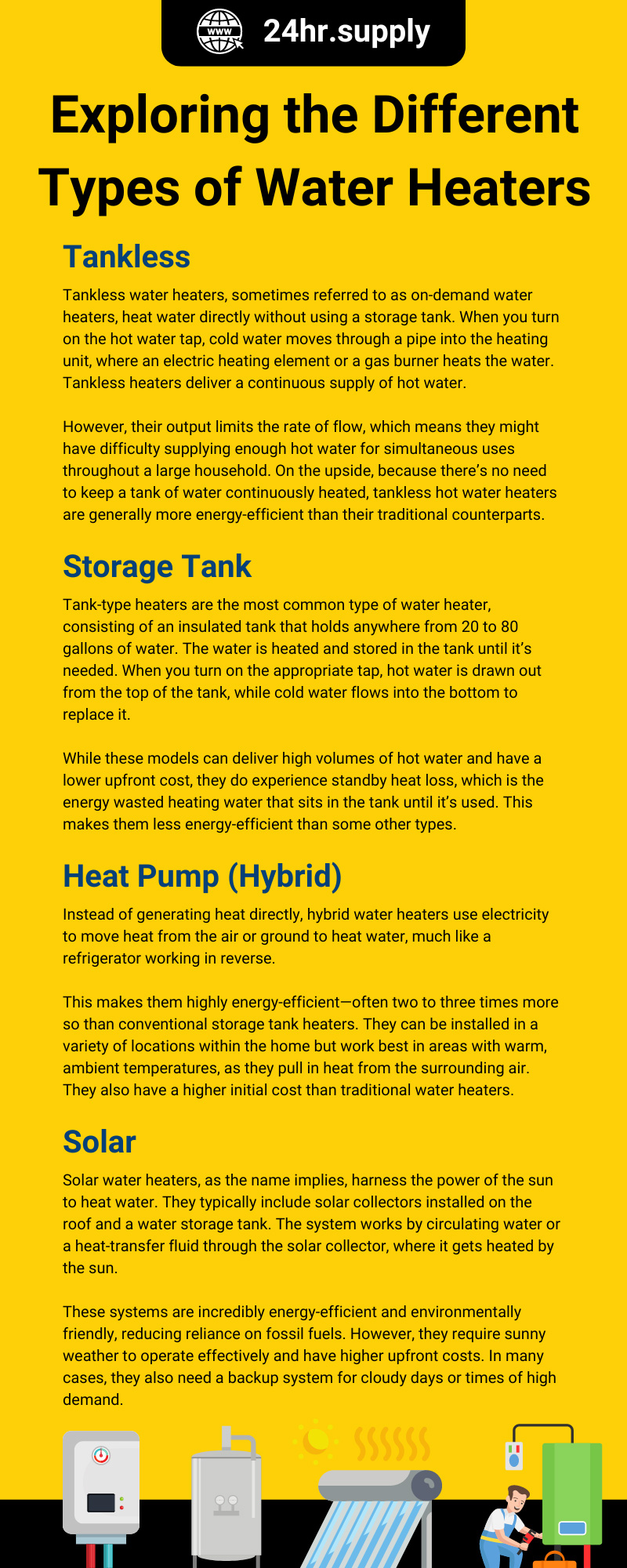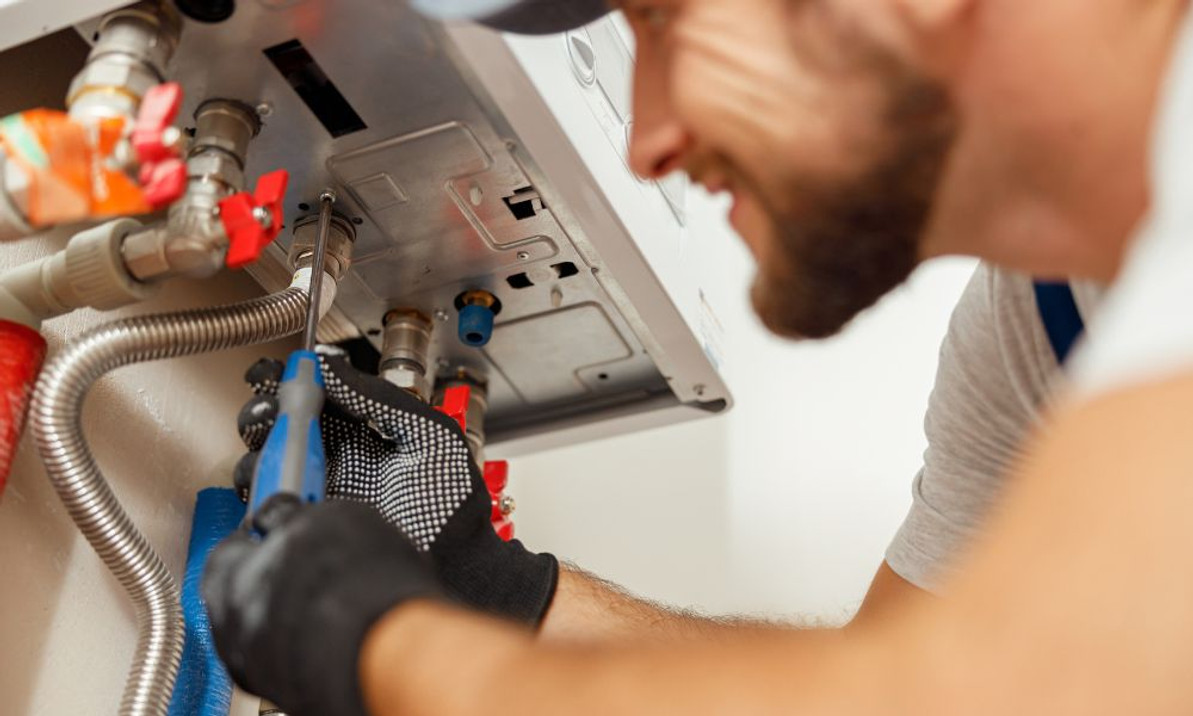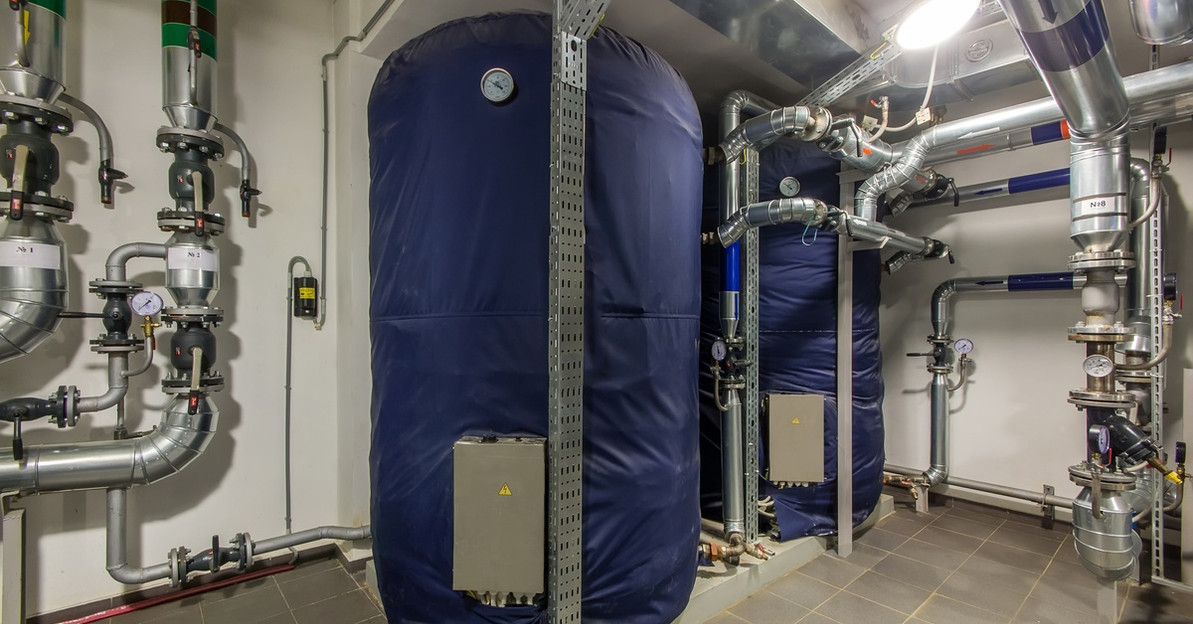Exploring the Different Types of Water Heaters
It’s easy to overlook the appliances that work quietly and tirelessly to keep our homes comfortable and functional. One such workhorse is the humble water heater. Whether it’s starting your day with a warm shower, washing your clothes, or doing the dishes, your water heater plays an indispensable role in everyday life.
But did you know that not all water heaters are created equal? From traditional storage tank models to modern tankless designs, solar-powered units, and energy-efficient heat pumps, each type of water heater comes with a unique set of benefits and drawbacks. Understanding these differences can help you make an informed decision when it comes time to purchase a water heater for your home.
Let’s explore the different types of water heaters available on the market. This way, you’ll be able to match a heater with your lifestyle and the needs of your home.
The Need for a Water Heater
Having a reliable source of hot water is crucial for everyday necessities. The role of a water heater in the home extends far beyond providing comforting hot showers. Various aspects of day-to-day life are greatly improved with the presence of hot water.
Hygiene and Comfort
Hot water plays an essential role in maintaining cleanliness and health. It’s vital for washing your hands and body effectively, as the hot water helps kill bacteria and other harmful microorganisms. Furthermore, hot water is key in achieving a thorough clean when doing laundry or washing dishes.
Home Heating
In colder climates, water heaters are often connected to the home’s central heating system. They provide the hot water needed to warm up the house through radiators or underfloor heating systems. Without a water heater, keeping your home warm and cozy during the chilly winter months would be quite a challenge.
Cooking
You need hot water for preparing many types of food, from boiling pasta and blanching vegetables to making a cup of tea or coffee. Having a water heater ensures you have hot water at your disposal whenever you need it.
Common Types of Water Heaters
Choosing the right water heater for your home means understanding the different types available. Each one has a unique set of features and benefits that can make it more or less suitable depending on your specific needs, the climate you live in, and your budget.
Tankless
Tankless water heaters, sometimes referred to as on-demand water heaters, heat water directly without using a storage tank. When you turn on the hot water tap, cold water moves through a pipe into the heating unit, where an electric heating element or a gas burner heats the water. The result of this process? Tankless heaters deliver a continuous supply of hot water.
However, their output limits the rate of flow, which means they might have difficulty supplying enough hot water for simultaneous uses throughout a large household. On the upside, because there’s no need to keep a tank of water continuously heated, tankless hot water heaters are generally more energy-efficient than their traditional counterparts. The initial cost of investing in this type of water heater can be higher, but the long-term energy savings can offset this.
Storage Tank
Tank-type heaters are the most common type of water heater, consisting of an insulated tank that holds anywhere from 20 to 80 gallons of water. The water is heated and stored in the tank until it’s needed. When you turn on the appropriate tap, hot water is drawn out from the top of the tank, while cold water flows into the bottom to replace it.
While these models can deliver high volumes of hot water and have a lower upfront cost, they do experience standby heat loss, which is the energy wasted heating water that sits in the tank until it’s used. This makes them less energy-efficient than some other types.
Heat Pump (Hybrid)
Instead of generating heat directly, hybrid water heaters use electricity to move heat from the air or ground to heat water, much like a refrigerator working in reverse.
This makes them highly energy-efficient—often two to three times more so than conventional storage tank heaters. They can be installed in a variety of locations within the home but work best in areas with warm, ambient temperatures, as they pull in heat from the surrounding air. They also have a higher initial cost than traditional water heaters.
Solar
Solar water heaters, as the name implies, harness the power of the sun to heat water. They typically include solar collectors installed on the roof and a water storage tank. The system works by circulating water or a heat-transfer fluid through the solar collector, where it gets heated by the sun.
These systems are incredibly energy-efficient and environmentally friendly, reducing reliance on fossil fuels. However, they require sunny weather to operate effectively and have higher upfront costs. In many cases, they also need a backup system for cloudy days or times of high demand.
Condensing
These heaters are an excellent option if you have natural gas or propane service and need a high-volume water heater. Condensing units capture heat from the flue gases that would typically escape through the vent and use it to heat the water in the tank.
This process makes condensing water heaters very efficient, especially for homes that use large amounts of hot water. They’re similar in design to traditional storage tank heaters but offer significant energy savings for large households.
Making Your Choice: Final Thoughts
Choosing a water heater is about more than just hot water; it’s about making an investment in your home’s comfort and efficiency. The right water heater can significantly enhance your quality of life while also reducing energy consumption and lowering utility bills.
When selecting a water heater, it’s important to consider the unique needs and demands of your household. Understand your daily hot water consumption, your home’s size and layout, and even your local climate. These factors can influence the type of water heater that will best suit your requirements.
Remember, the most expensive option isn’t always the best one for your situation. Sometimes, a more affordable model can serve your needs just as well, if not better. Explore the different types of water heaters out there and focus on finding a balance between upfront cost, long-term savings, and the convenience and comfort a particular unit can provide.

Recent Posts
-
7 Signs That Your Water Heater Is Leaking
A water heater might not be the flashiest appliance in your home, but when it starts acting up, it c …Jun 27th 2025 -
The Impact of Booster Pumps on Water Quality
Imagine turning on your faucet, only to watch a weak stream of water struggle its way out. It’ …Jun 16th 2025 -
Step-by-Step Guide To Installing a Commercial Water Heater
Installing a commercial water heater is a big project, especially when it directly impacts the comfo …Jun 10th 2025





